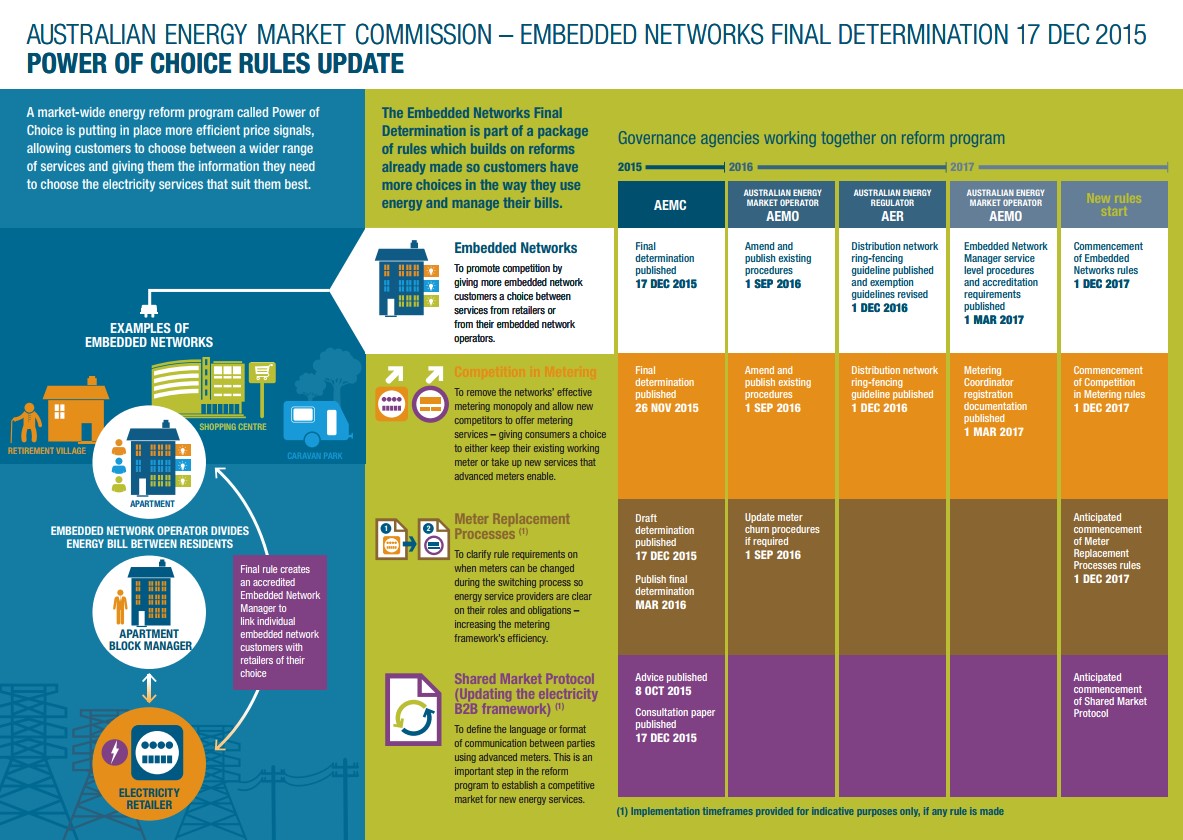New AEMC Rules for Embedded Networks
The regulators wish to ensure that competition is alive and well within embedded networks by making it easier for customers to access retail market offers. To that end, a new energy rule comes into effect on 1 December 2017. Most of the mechanics of that rule relate to improved management of the metering within embedded networks. To save you reading it chapter and verse, the AEMC have produced a succinct summary in an “information sheet” accompanied by an info-graphic (see below).
AEMC New Rules for Embedded Networks
The Embedded Network Manager
The AEMC information sheet states:
The changes to the National Electricity Rules set out in the final rule will create a new accredited provider role – embedded network manager – to perform the market interface functions that link embedded network customers to the National Electricity Market systems. The changes to the National Electricity Rules will also trigger changes in the relevant AEMO procedures and the Australian Energy Regulator’s (AER) network exemption guideline. Together, these amendments will:
- set out the detailed functions, responsibilities, and governance arrangements for embedded network managers; and
- specify which embedded network operators are required to appoint an embedded network manager.
In practise, this will mean that in most embedded networks there will be someone charged with the responsibility to sort out the metering. This Embedded Network Manager will be a market participant who is registered with the market operator to keep the central information systems up-to-date with metering details. The responsibilities in detail are shown in Appendix A.
Ever since WINconnect attained market participant status as an electricity retailer with access to CATS and MSATS, we have essentially performed this function as a matter of course. The introduction of the ENM category will greatly benefit the industry and streamline the data management aspects of competition within embedded networks.

APPENDIX A
ENM Responsibilities (extracted from AEMC Rule)
The scope of the day to day role of the ENM, will include but not be limited to:
(a) provide market interface services for child connection point End Users, which are services that link End Users to the NEM systems, for example:
(i) create Child NMI;
(ii) maintain Child NMI CATS Standing Data; and
(iii) maintain the Network Tariff Code for Child NMIs;
(b) upon request from a retailer, apply to AEMO for NMIs for child connection points in the embedded network for which they are the ENM;
(c) register Child NMIs in MSATS;
(d) provide the MC, FRMP, and EENSP with the NMI of the child connection point;
(e) establish and maintain the NMI Standing Data for its Child NMIs within MSATS;
(f) allocate Embedded Network Codes for their Child NMIs in MSATS;
(g) act in the Role of LNSP in MSATS for its child connection points;
(h) maintain and manage relevant EN wiring information and meter arrangements;
(i) assign a DLF to each child connection point in MSATS;
(j) provide AEMO with a list of all DLFs for all their child connection points indicating which ones were calculated by the EENSP; and
(h) maintain a register of all allocated Child NMIs.
An accredited ENM is required to maintain accurate and up to date wiring information including:
(a) type and configuration of metering installations for all child connection points;
(b) subtractive or other arrangements used in respect of those metering installations;
(c) relevant EN wiring information;
(d) version control of EN wiring information;
(e) DLFs applicable to each child connection point; and
(f) correspondence with all persons.
This may include, but not be limited to any of the following:
- Up to date schematics outlining any metering arrangements as they relate to each Connection Point at the site.
- A register of tenancies and meter identifiers
- A schedule of changes to metering arrangements
- Any site specific distribution loss factors
APPENDIX B
Glossary
| NEM | National Energy Market |
| NMI | National Meter Identifier |
| CATS | Consumer Administration and Transfer Solution |
| AEMO | Australian Energy Market Operator |
| ENM | Embedded Network Manager |
| MSATS | Market Settlements and Transfers Solutions |
| MC | Metering Coordinator |
| FRMP | Financial Responsible Market Participant |
| EENSP | Embedded Electricity Network Service Provider |
| SIR | Service and Installation Rules |
| DLF | Distribution Loss Factor |
| AER | Australian Energy Regulator |
| AEMC | Australian Energy Market Commission |
| NEL | National Energy Law |
| LNSP or DNSP | Local Network Service Provider or Distribution Network Service Provider |
| ESCV | Essential Services Commission Victoria |
| ENO | Embedded Network Operator |




